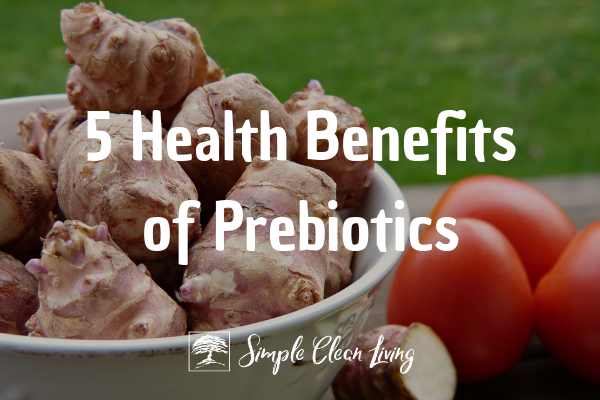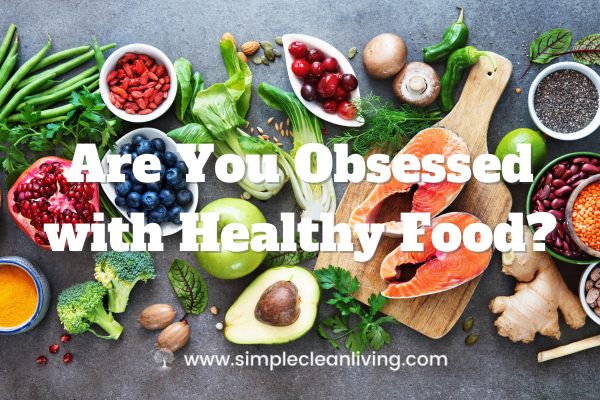Notice: I’m an affiliate for Amazon as well as other companies. Any links in this article may be affiliate links. I always appreciate it if you purchase something using my affiliate links. Doing so helps me to raise a little extra money that pays for the costs of running this site. And it allows me to continue bringing you quality content, all without costing you a thing! Thanks!
Most people have heard of probiotics. And many know that getting plenty of probiotics through supplementation and diet is great for gut health. In fact, experts regularly celebrate and encourage the use of probiotics because they support digestive health so well. But there is something else that fewer people know about…or understand that should always go with probiotics. Probiotics will not work unless you also have prebiotics.
What are prebiotics?
Prebiotics are a type of fiber that cannot be digested. Because it cannot be digested it easily passes through the small intestine. Once at the colon, the friendly microflora living there feed on it and cause it to ferment. This encourages good gut bacteria to grow and thrive. And that helps you to have a healthier gut!
Prebiotics can be found in plenty of foods, such as chicory, jicama, Jerusalem artichokes, dandelion greens, onions, and garlic. Eating these vegetables raw provides a higher level of prebiotics. Cooking destroys a good bit of the fiber and reduces the amount of prebiotics so you should choose raw when possible.
The body needs both pre and probiotics to thrive. And for many, increasing prebiotic fiber in the diet may be the missing link to healing gut issues once and for all!
Benefits of consuming prebiotic fiber
When you get plenty of prebiotic fiber in your diet, it will benefit your health. Some of the top benefits include:
Improved gut health and digestion
The health of the gut has a huge impact on the rest of the body. And most experts now encourage their clients and followers to work on improving gut health. Of course, the first priority of the gut is to digest the foods you eat. But when digestion isn’t occurring properly, a whole list of chronic health complaints will eventually follow. Improving gut health will allow nutrients to be better absorbed and can help to reverse issues like “leaky gut”. These health issues cause a cascade of other chronic health problems. Reclaiming gut health will help you on the path to restoring overall health.
Stronger immune system
Did you know that 70% of the human immune system lies in the gut? It does. So when the gut experiences digestive issues, it will have an impact on your immune function. When the gut has an imbalance of gut bacteria, digestive issues will occur and you may experience an increase in colds, flu, and other illnesses and diseases. So keeping a healthy population of happy, friendly gut bacteria helps to strengthen your immune system so that it can better fight off germs and protect you from disease.
Helps with weight loss
If you are getting adequate amounts of prebiotics daily you should see the number on the scale decrease. A study was published in 2002 in the British Journal of Nutrition. This study showed that prebiotics has an effect on the hormones that control appetite. The animals given prebiotics in the study produced less ghrelin, the hunger hormone. But human studies have shown that those who include prebiotic foods or supplements in their diet feel less hungry and get full faster. It may also help to balance blood sugar levels, preventing the release of insulin. Insulin encourages the storage of fat in the body. Definitely a win-win situation for those carrying some extra weight!
Helps balance hormones
More and more people deal with the effects of hormone imbalance every day. For many, these imbalances impact their quality of life. Symptoms of hormone imbalances include fatigue, brain fog, obesity, low libido, PMS, headaches, sugar cravings, night sweats…and many more. Many doctors will tell you that it’s just a part of aging. But I’m calling BS on that one! They are symptoms that you have a problem going on beneath the surface. And it can be corrected with the right support. You can support good digestion by including prebiotics. This will help you to re-balance your hormones.
Recent studies have shown a lowering of the stress hormone cortisol as well as an improvement in the production of neurotransmitters in subjects who regularly consumed prebiotic fiber. Neurotransmitters are the brain’s mood-balancing chemicals. The health of the gut has also been shown to have a direct link to estrogen production. Poor gut health has been linked to estrogen-related illnesses such as endometriosis, PCOS, and cancers such as breast, ovarian, cervical, and endometrial. Supporting gut health can help prevent these issues by creating hormone balance.
Lowers inflammation
Disease and inflammation go hand in hand. When chronic illness is present, the inflammation most likely is as well. But studies now show that consuming prebiotics may, in fact, reduce inflammation. They do this by supporting the colonization of healthy gut bacteria (the probiotics). Probiotics have been scientifically shown to reduce inflammation. A summary of 20 clinical trials showed a lowering of C-reactive protein, a common marker for inflammation in the body.
Prebiotic foods
I mentioned the richest prebiotic-rich foods earlier in this article. But some can be difficult to find in grocery stores. With this in mind, choose one of these more common prebiotic-containing foods instead!
- Apples
- Artichokes
- Asparagus
- Bananas (green bananas contain more prebiotics than ripe ones)
- Beets
- Bell Peppers
- Berries
- Cabbage
- Carrots
- Chia seed
- Coconut meat and flour
- Cucumbers
- Flax seed
- Ginger root
- Hemp seeds
- Honey
- Mango
- Onions
- Pumpkin seeds
- Quinoa
- Radishes
- Sweet potatoes
- Tomatoes
Even with a diet rich in fruits and vegetables, it can be hard to get enough prebiotic fiber to support gut healing. You can always choose to add additional fiber in supplement form. I have personally done that and have seen some benefits that I did not see without the extra fiber. This is one of the brands I’ve tried. (sponsored link). If possible, find an organic brand to reduce pesticide exposure.
Some people have sensitivities to FODMAP foods. Many of the foods that are sources of prebiotic fiber are FODMAP foods. FODMAP stands for fermentable oligosaccharides, disaccharides, monosaccharides, and polyols. Those who are sensitive experience gas, bloating, abdominal pain, and diarrhea when consuming FODMAP fiber. Low and no FODMAP prebiotic alternatives do exist! This is one example, but there are many others! You can find one that works for you!
You must begin healing the gut if you want to improve your health. Adding great probiotic-rich foods like sauerkraut and kimchi and beverages like kombucha and kefir can help to add beneficial bacteria to your gut. You must also give that bacteria the food it needs to thrive! Doing so is a big step towards overhauling your health.




